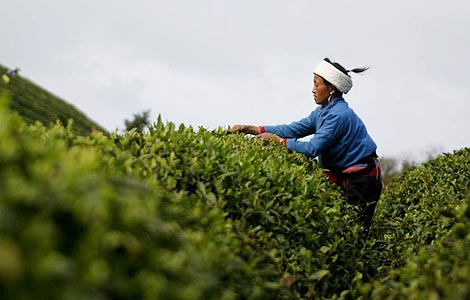 |
|
|
|
|||||||||||
| ?
 |
|
A woman picks tea leaves at a tea plantation in Duyun, Southwest China's Guizhou province, April 20, 2012. [Photo/Xinhua]
|
Jian Qiu, a researcher from the ministry's pesticide examination office, made the comments Saturday after a recent report revealed that some products manufactured by a foreign tea company and sold in China have higher levels of several types of pesticide residue.
Some of the residues were said to be within China's standards, while European standards completely ban their use. The report triggered public concern about the double standard, as well as China's food safety threshold.
"China's standards for pesticide residue levels were made in full accordance with principles set down by the Codex Alimentarius Commission and the food consumption habits of Chinese people," Jian said.
Jian said that since different countries have different consumption capacities, climates, plant diseases and insect pests, it is impossible to compare one country's pesticide residue standards with those of another country.
Dong Hongyan, a senior official from the ministry's supervision bureau for agricultural product quality, said the ministry has banned several types of pesticides from use in tea harvesting and has also promoted uniform criteria for tea plantations to reduce possible harm from the irregular use of pesticide.
According to Dong, the ministry will make more efforts to encourage planters to use more efficient and low-toxicity pesticides and further improve the country's regulations for pesticide residue in line with the Codex Alimentarius Commission.

|

|

|

|

|

|